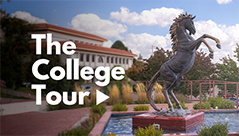The Western New Mexico University Board of Regents raised tuition by 8% and approved a 12% increase to student fees, also adding a $25 per credit hour textbook fee during their meeting Wednesday afternoon.
The board also voted to permit the purchase of former St. Mary’s Church and Academy on Alabama Street in order to improve access to the acreage where the university plans to build a new early childhood center and “possibly a charter school,” according to WNMU President, Dr. Joseph Shepard.
Members approved a change to the scope of the Deming Learning Center Infrastructure Project as well, citing a rise in construction costs. The board approved the third quarter financial actions report, a formality declaring that WNMU does not have any financial concerns at this point in the fiscal year.
In his university president’s report, Dr. Shepard noted that the prospect of reaching his goal of increasing enrollment to 4,000 students by fall 2022 — dubbed 4k — was “doubtful” but that fall applications are up 119%. “We are on track to have the highest number of applicants this university has ever had,” he said.
Presenting the 8% tuition hike for resident undergraduate and graduate students and for parttime non-resident students, Dr. Shepard listed the gaps in the university’s state funding. “When we got funded on the 7% compensation raise, we only got 80%. That shortfall equals about $500,000. The education retirement board also mandates that we contribute 2% toward the benefits. We only get funded for 1%. That’s not even mentioning factoring in inflation, which gets magnified,” he said. “I’m conscious of what that means for a small institution. This conversation is about the revenue associated with a budget.” A detailed chart outlining the exact tuition cost per credit hour is available here.
Before the members of the board voted unanimously in support of the tuition increase, which caps the cost for students taking more than 18 credit hours at the rate of just 18 credit hours, Vice President for Business Affairs Kelley Riddle said, “This will result in about a $1.8 million increase in tuition revenue.”
Regent Dr. Daniel H. Lopez expressed concern for students and families, saying, “The reason I support the increase is because if you don’t have enough money, you can’t have a quality university. There’s no other way to fill that gap.”
Associated Students of WNMU President Richard Mubanga presented the proposed schedule of 2022-23 student fees totaling $55.50 per credit hour, which is $6.10 more than the 2021-2022 academic year.
Requesting the board’s approval of a new $25 per credit hour administrative fee, which rolls textbook costs into tuition and fees, Dr. Shepard said, “If an average student takes five courses and each textbook costs a hundred bucks. that would be $500. If this fee passed at $25 for the same 15 credit hours, I’ve just saved $125 from what I’ve been paying.”
Regent Chair Dr. Mary Hotvedt, who is a former adjunct professor with WNMU, said, “Student success depends on having the text from the beginning.”
Discussing revisions to the capital project transmittal for the Deming Learning Center, Riddle assured members of the board that, with the new plan, WNMU would be able to fully fund the proposed building and suggested that the upcoming GO Bond, if it passes, would support the overall completion the project. “The original scope was a 14,000 square foot structure. We’ve cut that down to almost 8,600,” she said.
Before the meeting adjourned, Dr. Shepard announced that the university plans on holding a commencement ceremony for the graduating Zambian students in their home country. “We’re going to have a wonderful ceremony in Zambia,” said Dr. Hotvedt, who is the Regent Chair and has familiarity with Zambia.
The WNMU board of regents scheduled its next meeting, which will focus on the fiscal year 2022-23 budget, for Thursday, April 28. A recording of this week’s meeting is posted here.


